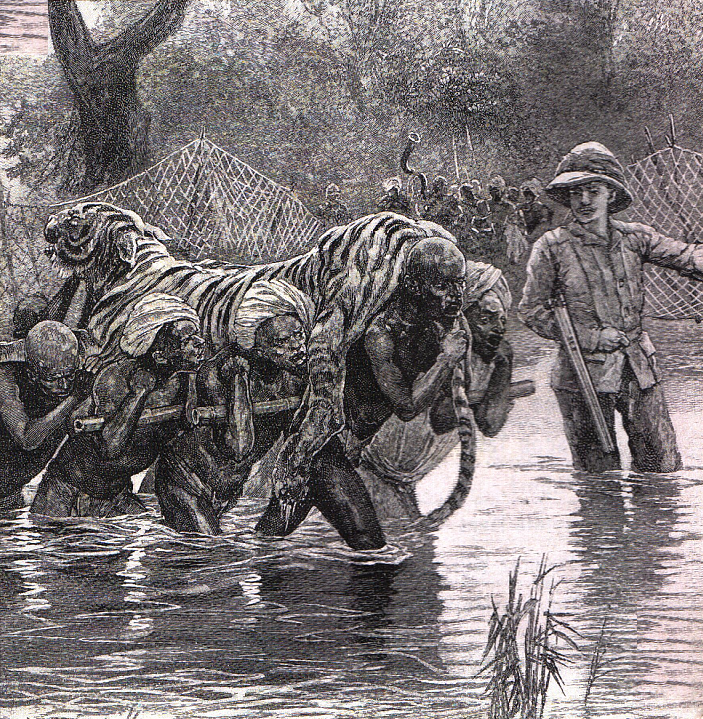
Attitudes to Empire

Introduction
In the nineteenth century, the British Empire continued to grow. There was a 'scramble' for colonies, especially in Africa. By 1900 the British Empire had become 'the empire on which the sun never set'. It provided food for Britain's population, raw matenals for Britain's factories and markets for British products. The Empire made Britain rich.
What did the British think about their empire and its peoples?
Links:
The following website will help you research further:
The British Empire:
•
A summary video,
showing some of the pros and cons. • a list of
Highlights of 19th Century Foreign Policy
to extend your factual knowledge.
1 Victoria Station, Bombay
The British built railways in all parts of their empire. By 1900, they had laid 10,000
miles of railway track in India.
After you have studied this webpage, answer the question sheet by clicking on the 'Time to Work' icon at the top of the page.
2 A Children's Encyclopaedia, 1930s
An extract from Newnes Pictorial Knowledge.
One of the wonderful stories of history is that which tells how a little group of islands [the British Isles] ... became the Motherland of the greatest Empire the world has ever seen...
There must be something remarkable about these islands which have become the centre of an Empire which covers about one-fifth of the lands of the globe and is the home of at least a quarter of the world's people.
3 A British Official, 20th Century
Law and order is perhaps the most important advantage that we British gave to our colonies... We took the ideas of liberty, equality, justice and democracy to the colonies. With these came the advantages of civilisation, closely followed by the benefits of technology.
What were these advantages? First – ease of travel, secondly – education, thirdly – public health. In addition to the fight against disease, our experts helped to provide sanitation and pure water supplies. Also there were improvements in agriculture.
4 Martin Roberts, 1972
An extract from Machines and Liberty, an A-level textbook.
If the native people rebelled, European soldiers killed and tortured them. The profits of the colonies did not go to benefit the native people, who were desperately poor, and whose cheap labour allowed the big profits to be made. Instead, they went to the wealthy shareholders in London.
Finally, there was the constant and needless humiliation of the natives. Almost all Europeans took it for granted that they, the Whites, were a superior people who automatically deserved the respect and service of the coloured races whom they ruled.
5 Bishop Reginald Heber, 1819
A verse from a hymn, written for a church missionary service.
From Greenland's icy mountains,
From India's coral strand,
Where
Africa's sunny fountains
Roll down their golden sand...
In vain with
lavish kindness
The gifts of God are strown,
The heathen in his
blindness
Bows down to wood and stone.
Can we, whose souls are
lighted
With wisdom from on high,
Can we to men benighted
The lamp of
life deny?
Salvation! O Salvation!
The joyful sound proclaim,
Till each
remotest nation
has learned Messiah's name.
Glossary:
•
'Heathen': not Christian • 'Benighted': backward, ignorant •
'Messiah': Jesus Christ
6 Monier Williams, 1878
Monier WIlliams visited India in 1875; this extract his from his book Modern India.
An educated native once complained to me that most Englishmen seemed to him to walk about the world with an air as if God intended the whole universe to be English.
7 Lord Mayo, 1870
Lord Mayo was Viceroy of India from 1869 to 1872, when he was assassinated by an Indian.
We are all British gentlemen engaged in the magnificent work of governing an inferior race.
8 An Indian protestor, 1907
Leaflet written by an Indian protester in Bengal, India.
Can these thieves really be our rulers? These thieves import a huge number of goods, made in their own country, and sell them in our markets, stealing our wealth, and taking life from our people.
Can those who steal the harvest from our fields and doom us to
hunger, fever and plague really be our rulers?
Can foreigners really be our rulers, foreigners who impose on us even more taxes?
9 Tiger Hunt, 1892
British hunter returning from a hunt in Mysore, India, in 1892.
